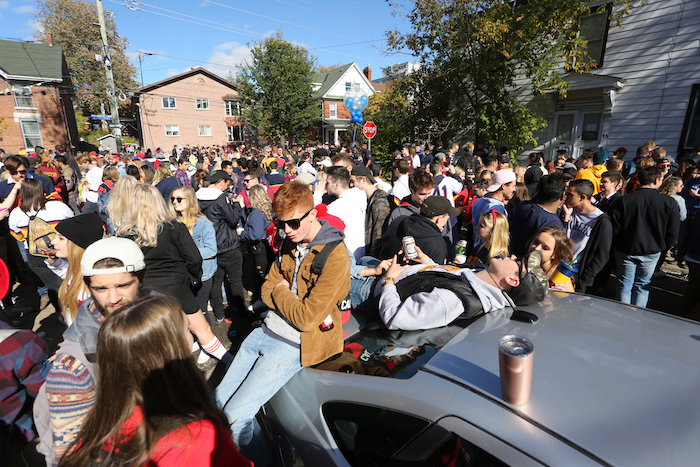McGill homecoming has come and gone, unappreciated and hardly attended. Many students lament this apparent lack of pride and the absence of support for athletics at McGill, while most are simply apathetic. But, university homecomings are not really about pride in athletics: They’re about partying. When McGill students decry our lack of school spirit, they’re usually referring to the absence of a Queen’s-style street party or mass hysterics in a sea of red. Perhaps such manifestations of pride aren’t something we should really be aspiring to.
Rather than representing a unified student culture, outbursts of ‘school pride’ at other schools’ homecomings are more indicative of an overly homogenized campus. If you go to a university like Queen’s or Western, conformity to the party mob is an inescapable requisite to participation in campus life. For mass-debauchery enthusiasts, McGill is well covered with Carnival, Faculty Olympics, and Science Games, to name a few. To our credit, McGill doesn’t conflate its parties with its identity in the same way some other schools seem to.
McGill’s lack of uniform pride is a symptom of its cultural diversity. Queen’s and Western follow the American model of school pride, synonymous with fraternities and game-day tailgates. However, McGill isn’t suited to this sort of monocultural assertion. Unlike Kingston or London, Montreal is an international hub, and its sociolinguistic diversity is reflected within McGill’s 30-per-cent-international student body. For many international students—except maybe our 2413 American peers—this model of school spirit is not part of their cultural lexicon. McGill subcultures engage with a broader and more variable community than can be found in smaller cities.
Even if this model were compatible with McGill’s culture, a conventional homecoming is a logistical impossibility. McGill doesn’t have a student neighbourhood coherent enough to facilitate a big homecoming event. The 80 percent majority of the Milton Park neighbourhood that is not McGill students—not to mention the Montreal police—would never tolerate that kind of party. Queen’s students are able to disregard the annoyance of Kingston locals largely because the university’s presence is so powerful in such a relatively small city. Similarly, at Western, where an unauthorized homecoming event incurred an estimated $100,000 in damage, students command a sufficient presence to make the event practically unstoppable. In fact, when the university tried to diminish the scale of the celebration by moving it to a weekend during the midterm season, Western students continued hosting the event on the same weekend, cutting the event’s affiliation with the university’s homecoming weekend. The party is now called #FOCO, or ‘fake homecoming.’ McGill students do not command the same necessary presence in Montreal to initiate such an event.
However, we shouldn’t want to. Perhaps to the detriment of our athletic culture, McGill doesn’t conform to what is, ultimately, a fallacy of group identity, one that is non-inclusive and that discourages independent subculture. McGill defines itself through its many outlets for communal engagement. Whether they are a part of Carnival, Model UN, or varsity football, McGill students all participate in an egalitarian conception of communal identity—one that resists the homogenizing spectacle of homecoming.








